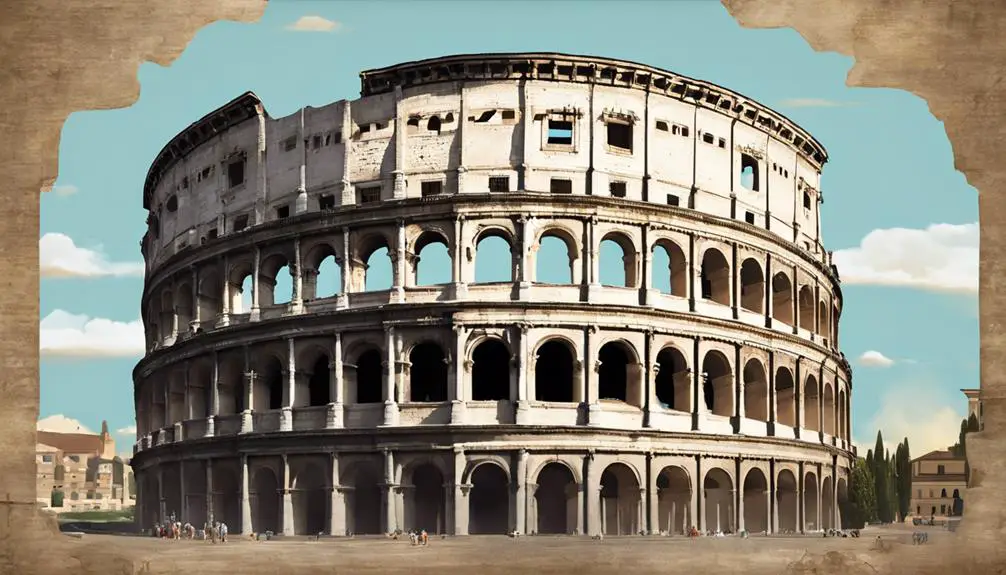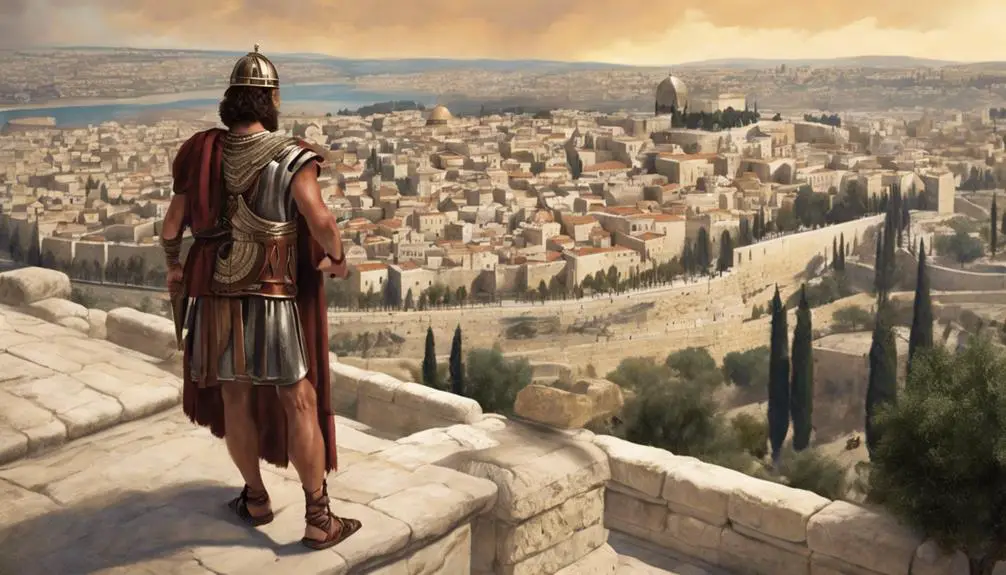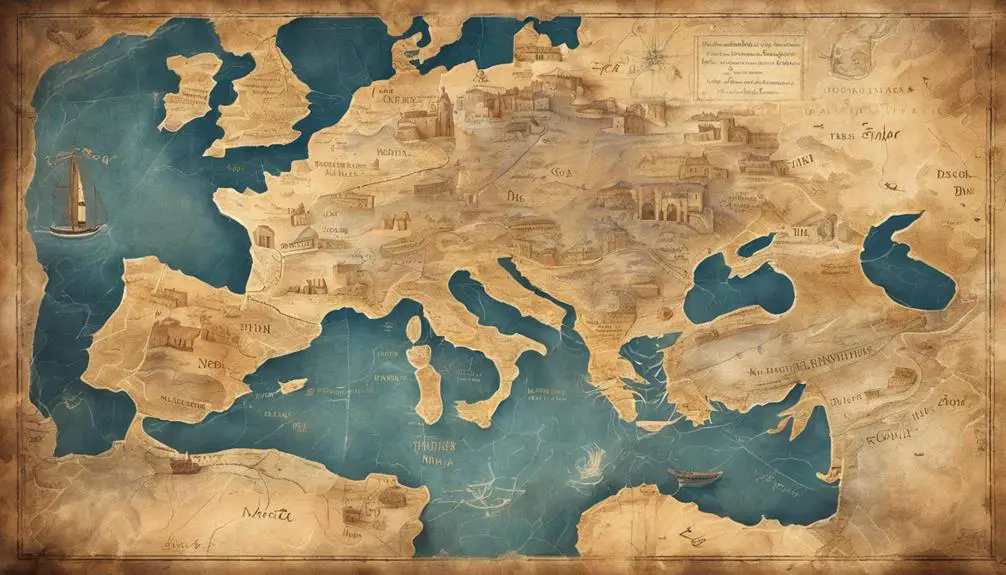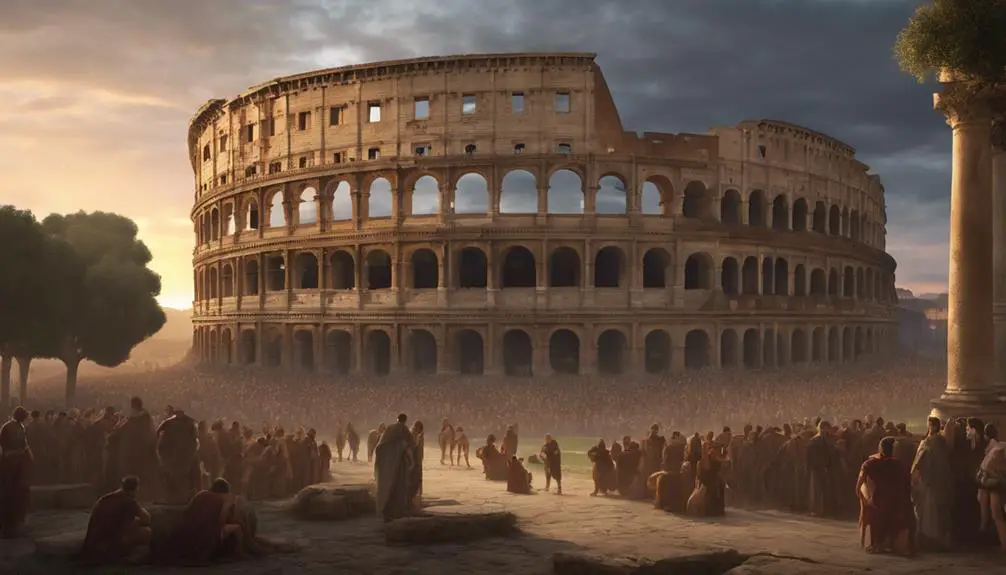Immerse in the tale of how the Roman Empire's intricate history intertwines with biblical narratives, revealing a complex relationship that shapes faith.

The Roman Empire in the Bible
Imagine walking through the bustling streets of ancient Rome, the heart of an empire that profoundly shapes the narrative of the Bible.
You're about to explore how this mighty civilization's politics, culture, and conflicts intertwined with the early Christian community, from the birth of Jesus under Roman governance to Paul's missionary journeys across Roman territories.
The relationship between the Roman Empire and the Bible is complex, filled with moments of oppression, rebellion, and profound spiritual revelation.
As you venture into this discussion, you'll uncover how these historical intersections have left indelible marks on Christianity and its development, inviting a deeper understanding of faith in a historical context.
Key Takeaways
- The Roman Empire's governance shaped the backdrop for the New Testament narratives.
- Jesus' birth intersected with Roman political dynamics, challenging existing power structures.
- Paul's missionary journeys under Roman rule were pivotal in spreading early Christianity.
- Roman persecution profoundly influenced the development of Christian identity and moral teachings.
Historical Context

Navigating through the annals of history, it's clear that the Roman Empire's political and cultural dominance significantly shaped the biblical narrative's backdrop. The intricate web of Roman politics and its ramifications played a pivotal role in the unfolding events recorded in the scriptures. Rome's governance, characterized by a complex hierarchy and stringent laws, imposed a framework within which the Jewish society operated.
The imposition of Roman rule ignited a series of Jewish rebellions, as documented in historical and biblical accounts. These uprisings weren't just military confrontations but were deeply rooted in the struggle for religious freedom and political autonomy. The Jewish rebellion against Roman authority is a testament to the clash of cultures and ideologies that pervaded the era.
This tumultuous relationship between the Roman Empire and the Jewish people set the stage for significant biblical events. The Roman political machinery, with its might and reach, inadvertently facilitated the spread of Christianity by providing the roads and peace necessary for the early apostles to travel and preach. However, this same Roman backdrop also contributed to the persecution of early Christians, illustrating the complex interplay between Roman politics and the nascent Christian movement.
The Birth of Jesus

Against the backdrop of Roman dominance, the birth of Jesus emerged as a pivotal event with profound implications for both the Jewish people and the burgeoning Christian movement. The Star prophecy, deeply entrenched in Jewish tradition, found its fulfillment in this historical moment, signifying a messianic expectation that challenged the existing Herodian dynasty and the broader Roman authority. This prophecy, which spoke of a new king's birth, was interpreted by many as a direct threat to the Herodian rule, a client kingdom under Roman oversight.
The Herodian dynasty, known for its complex relationship with both Rome and the Jewish populace, faced a unique challenge with the birth of Jesus. As a figure positioned at the intersection of divine prophecy and political intrigue, Jesus' birth wasn't merely a religious event but also a socio-political catalyst. It underscored tensions between the Jewish expectation of a Messiah and the Herodian and Roman interest in maintaining control and order.
This event, therefore, didn't exist in isolation but was a critical point of convergence for various narratives of power, faith, and resistance within the Roman Empire. The implications of Jesus' birth on the Herodian dynasty and the larger Roman political landscape underscored the intricate interplay between religion and politics in ancient times.
Paul's Missionary Journeys

Following the birth of Jesus, a key figure who'd further shape Christianity's spread across the Roman Empire was Paul, whose missionary journeys played a crucial role in the dissemination of the Christian faith. You'll find that Paul's travels, marked by resilience in the face of adversity, were instrumental in establishing early Christian communities throughout the Mediterranean basin.
Accompanied by companions like Silas, Paul navigated a world that was often hostile to the fledgling faith. His journeys, chronicled in the Acts of the Apostles, showcase a relentless pursuit of his mission, spanning cities from Jerusalem to Rome. You'd observe that Paul's methods were as varied as the regions he visited, adapting his message to resonate with Jews and Gentiles alike, a testament to his strategic approach to evangelism.
Notably, Paul's voyages were fraught with danger, including several shipwrecks that tested his faith and perseverance. These episodes highlight not only the physical challenges of travel in the ancient world but also the spiritual and emotional resilience required to spread a new faith across such a vast and diverse empire. Through analysis of Paul's journeys, one gains a deeper understanding of the complexities and dynamics that shaped the early Christian church's expansion.
Early Christians and Rome

The relationship between early Christians and the Roman Empire was complex, shaped by a blend of persecution, adaptation, and eventual integration. Initially, Christians faced significant challenges due to their refusal to participate in the Roman state religion, which often led to persecution. This persecution was not constant but varied in intensity depending on the ruling emperor and the political climate.
Christian persecution under the Roman Empire can be broken down into distinct periods and reasons, as shown in the table below:
Emperor |
Reason for Persecution |
|---|---|
Nero |
Scapegoating for the Great Fire of Rome |
Domitian |
Accusations of atheism and political subversion |
Trajan |
Expansion of empire-wide policies against Christians |
Decius |
Requirement for all citizens to perform public sacrifices |
Diocletian |
Systematic attempt to eradicate Christianity |
This table highlights how Roman politics significantly influenced the treatment of Christians. The empire's need for unity often clashed with the Christians' refusal to conform to state religious practices, leading to periods of intense persecution. However, as the empire evolved, so did its approach to Christianity, moving from outright persecution to a more integrated relationship, especially after the conversion of Constantine. This shift in relationship underscores the complexity of early Christian interactions with Roman politics and society.
Spiritual Implications

Christianity's journey through the Roman Empire's periods of persecution had profound spiritual implications for its believers, shaping their faith and practices in ways that resonated deeply within the early Church. These trials weren't merely seen as earthly challenges but were interpreted through the lens of divine prophecy, signaling both a test and a testament of their unwavering faith. The narratives of endurance, sacrifice, and martyrdom underscored the fulfillment of prophetic words, reinforcing the believers' trust in the divine plan.
Moreover, the moral teachings of Christianity found a unique soil in the Roman context. The emphasis on virtues such as humility, forgiveness, and love for one's enemy contrasted sharply with Roman societal norms, which often celebrated power, conquest, and retribution. This stark difference highlighted the transformative power of Christian moral teachings, not only on a personal level but also as a critique and alternative to the prevailing Roman ethos.
As such, the spiritual journey of early Christians through the Roman Empire was marked by a profound engagement with divine prophecy and moral teachings. These elements were instrumental in shaping a distinct Christian identity, fostering a sense of divine purpose, and offering a moral compass that guided believers through times of great adversity.
Frequently Asked Questions
How Did Roman Legal Practices Influence the Trial and Crucifixion of Jesus?
Roman legal practices significantly influenced the trial and crucifixion of Jesus by establishing legal precedents that led to his condemnation.
You'll find that the crucifixion's significance stems from these legal frameworks, which allowed for a form of capital punishment reserved for non-citizens and those considered a threat to Roman order.
These practices ensured a trial that, while influenced by local pressures, adhered to Roman judicial procedures, culminating in Jesus' crucifixion.
What Role Did the Roman System of Roads and Infrastructure Play in the Spread of Christianity?
The Roman roads and infrastructure were the veins through which ideas, including Christianity, pulsed across vast distances. These architectural innovations, originally designed for military campaigns, inadvertently laid the groundwork for the rapid spread of new beliefs.
Were There Specific Roman Emperors Whose Policies Significantly Altered the Course of Christian History, Outside of Those Mentioned in the Acts of the Apostles and the Pauline Epistles?
Yes, certain Roman emperors' policies drastically changed Christian history beyond biblical accounts. Nero's Persecutions marked a brutal phase of Christian oppression, significantly impacting early Christian communities.
Later, the Constantinian Shift, initiated by Emperor Constantine, transformed Christianity's status within the Empire, promoting its spread and acceptance. These events, not detailed in biblical texts, underscore the profound influence of imperial policies on Christianity's evolution and societal integration.
How Did the Roman Practice of Syncretism Affect the Early Christian Church's Development and Doctrinal Formation?
You're exploring how syncretism impacted early Christian church development and doctrine. The Roman practice, blending pagan rituals with new religious beliefs, led to cultural assimilation that significantly shaped Christianity.
This merging not only influenced ritualistic practices but also doctrinal evolution, as the church sought to define itself amidst diverse religious landscapes. It's a complex process of negotiation, where Christianity both absorbed and resisted elements of Roman culture, crafting a unique identity.
In What Ways Did the Socio-Economic Structures of the Roman Empire Impact the Composition and Distribution of the New Testament Texts?
You're exploring how socio-economic structures influenced the New Testament's creation and spread. These structures facilitated diverse scriptural interpretations and were a breeding ground for religious persecution, which, in turn, shaped the texts' content and dissemination.
The empire's vast network allowed for the rapid spread of Christianity, despite barriers. This environment necessitated a flexible, adaptable approach to both doctrine and practice, deeply impacting the early Christian church's evolution.
Conclusion
In your journey through the annals of time, you've witnessed how the Roman Empire, a colossus striding across history, intertwined with the nascent whispers of Christianity.
You've seen Paul's odyssey across this behemoth's heartlands, spreading a message that would echo through eternity. The early Christians, navigating the labyrinth of Roman power, sowed seeds of spiritual revolution.
This intricate dance between empire and faith highlights a profound narrative of resilience, adaptation, and transcendence, enriching our understanding of the past.



Sign up